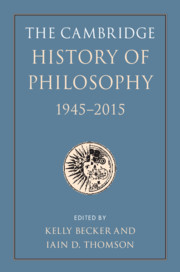Book contents
- The Cambridge History of Philosophy, 1945–2015
- The Cambridge History of Philosophy, 1945–2015
- Copyright page
- Contents
- Contributors
- Preface and Acknowledgments
- Introduction
- Part I Analytic Philosophy
- Part II Continental Philosophy
- Part III Bridge Builders, Border Crossers, Synthesizers, and Comparative Philosophy
- Section Eight Bridge Builders, Border Crossers, Synthesizers
- Section Nine Comparative Philosophy
- 49 Authenticity and the Right to Philosophy
- 50 The East in the West
- 51 Jewish Philosophy and the Shoah
- Part IV Epilogue: On the Philosophy of the History of Philosophy
- References
- Index
51 - Jewish Philosophy and the Shoah
from Section Nine - Comparative Philosophy
Published online by Cambridge University Press: 08 November 2019
- The Cambridge History of Philosophy, 1945–2015
- The Cambridge History of Philosophy, 1945–2015
- Copyright page
- Contents
- Contributors
- Preface and Acknowledgments
- Introduction
- Part I Analytic Philosophy
- Part II Continental Philosophy
- Part III Bridge Builders, Border Crossers, Synthesizers, and Comparative Philosophy
- Section Eight Bridge Builders, Border Crossers, Synthesizers
- Section Nine Comparative Philosophy
- 49 Authenticity and the Right to Philosophy
- 50 The East in the West
- 51 Jewish Philosophy and the Shoah
- Part IV Epilogue: On the Philosophy of the History of Philosophy
- References
- Index
Summary
Richardson recounted this same anecdote thirty years later at the 1995 conference on the work of Emmanuel Levinas hosted by Loyola University in Chicago. Here, he reveals more details in a story that was otherwise shrouded in mystery: “The gentleman” was none other than Emmanuel Levinas. The reception was Richardson’s post-dissertation celebration at Louvain. And Levinas, who had just published Totality and Infinity (1961), served as one of the examiners. In addition to revealing more details, Richardson also confessed that he had not forgiven Levinas for what Richardson interpreted, in the sardonic joke, as a lapse in Levinas’s ethical judgment. Richardson insinuated that Levinas’s lapse demonstrated that he (Levinas) was unable to live up to his own ethical command.
- Type
- Chapter
- Information
- The Cambridge History of Philosophy, 1945–2015 , pp. 709 - 722Publisher: Cambridge University PressPrint publication year: 2019

